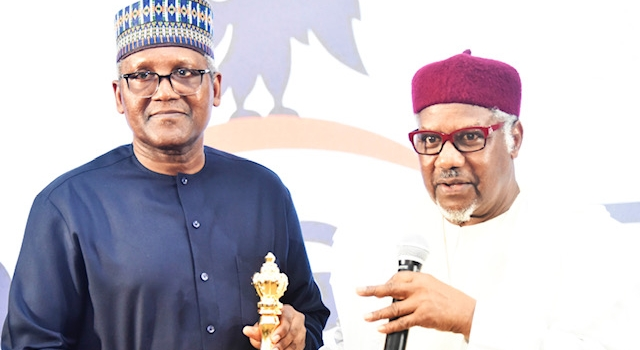Dangote wants dealers in foreign textile materials jailed, law banning sale of imported fabrics
by ebor cletus ralph jr

Aliko Dangote, a business mogul and the president of the Dangote Group, has argued for prison sentences for those who traffic in foreign textile materials in an effort to reduce imports and increase domestic textile production.
He also demanded parliamentary support, urging the passage of legislation that would make it illegal to sell imported fabrics domestically.
Yesterday in Lagos, he delivered a speech as a guest speaker at the historic 50th Annual General Meeting of the Manufacturers Association of Nigeria (MAN) and the 2nd Adeola Odutola Lecture.
During the AGM, themed: “An Agenda for Nigeria’s Industrialization for the Next Decade”, where a Blueprint for the Accelerated Development of Manufacturing in Nigeria 2.0 was unveiled, Dangote expressed optimism, noting that with the collective effort of all stakeholders, it was feasible to move Nigeria from “developing nation” to “newly industrialized nation”.
In addition to making other suggestions, the business magnate identified infrastructure and core industry investments as crucial solutions for raising Nigeria’s economy to the required level among modern nations and in the global economy.
The Federal Government was advised by Africa’s richest man to use strategically prioritised infrastructure investments to buck the trend and raise Nigeria’s economy to its desired level among modern nations and around the world in light of the manufacturing sector’s decreasing fortunes.
Dangote stated that while laying up a precise plan for the next ten years, it is critical that the well-known issues slowing industrialization be addressed head-on. He recommended, among other things, prioritising investments in infrastructure and core sectors as essential fixes to lift Nigeria’s economy to the required level among modern nations and in the global economy.
Nigeria’s industrialization and development progress needs to be sped up, according to Dangote, who outlined a number of necessary initiatives. The federal government’s recent efforts to ensure the security of people, property, and investments across the country were supported by these measures, which included investments in infrastructure, the development of core industries, the creation of business-enabling Policy Frameworks, the stabilisation of the macroeconomy, the facilitation of sectoral linkages, and investments in core industries.
The business titan examined the performance of the industrial sector in Nigeria; identified the nexus between industrialization and economic development with Nigeria and China as case study; analyzed the manufacturing sector in the country with focus on its growth trajectory, current status and challenges, and set an agenda for the next ten years with an implementation roadmap.
According to him, “the experience in various parts of the world has shown that industrialization drives economic growth & development, which improves living standards as evident by the high output and per capita income in industrialized countries.
“The rate of industrialization in Nigeria has been slow as evidenced by the low contribution of manufacturing to GDP, poor capacity utilization and constrained export of manufactured products within and outside the continent. For instance, Nigeria’s share of world output of 0.41%, ranked 29th in the world which is unimpressive, considering its size and resource endowments. It ranks poorly, when compared with India at (3.1%), South Korea (3.0%) and China (28.7%).
“Nigeria’s industrialization process has been greatly challenged by structural and institutional constraints, particularly funding. These factors have over the years cumulatively contributed to its disappointing performance. For instance, in the last decade, average share of manufacturing value added to GDP in countries like China and Malaysia stood at 41% and 38% respectively; compared to 25% in Nigeria.
“In terms of capacity utilization, a major performance indicator which reflects the ability of manufacturing companies to meet rising demand without increasing cost, Nigeria achieved a rate of 55% compared to 76% and 78% in China and South Africa respectively. The country’s dwindling industrial performance has significant socio-economic implications, as poverty and unemployment continue to rise.
“From 1960 to 2003, the development trajectory of China by far outpaced that of Nigeria within the same period even though Nigeria began on a seemingly better footing. It is therefore important to track back to where Nigeria “dropped the ball” with a view to repositioning the country to the path of growth, development, and social upliftment.
“Based on the comparative analysis of Nigeria and China, one can safely make the following deductions (i) the numerical strength of a nation (population) can indeed be translated into economic wealth (ii) steady growth in manufacturing output is possible when the operating environment is conducive; (iii) no nation can easily transit from “developing” to “newly industrialized” without a vibrant manufacturing sector; (iv) effective implementation of long term plans backed with policy consistency will promote enduring economic growth and development”, the industrialist added.
According to Dangote, ” Nigeria’s manufacturing sector is dominated by light manufacturing with only a few firms operating in the heavy segment of the sector. There are several factors that need to be in place to accelerate the growth of the manufacturing sector in Nigeria. These include: security and rule of law, industry-oriented government policy; adequate infrastructure; industry-oriented Research & Development (R&D); a well-developed SME sector; building of human capacity, and embrace of technology to improve efficiency through automation of manufacturing processes”.
On current status of the manufacturing sector, Dangote noted that manufacturing was singled out in the Nigerian Industrial Revolution Plan (NIRP) as the driver of industrialisation and economic growth.
“The contribution of manufacturing to Real GDP in Nigeria contrasts with what was obtained in countries like China (27.16% in 2019); Germany (19.11%); Japan (20.74%) and South Africa (13.53%). To drive industrialization and sustained economic growth in Nigeria, it is important that deliberate policies that are manufacturing-specific should be designed to support manufacturing activities and address the perennial challenges of the sector. It is important to note that the current government policies, if fully implemented, are good enough to address most of the challenges we are now facing,” he said.
Among manufacturing challenges, he identified acute shortage of forex; dearth of long-term funds; limited infrastructure; policy inconsistency/implementation/ enforcement; over-regulation; multiple and high taxes for the industries (the manufacturing sector is beset with over thirty statutory taxes, levies, fees, etc. charged at multiple tiers of government), and insecurity.



